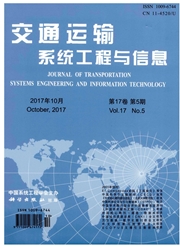

 中文摘要:
中文摘要:
当城市轨道交通列车在运行过程中因设施设备失效、司机操纵不当、上下车客流过多等外部因素发生晚点时,需对晚点列车的计划运行时分进行调整.为保证城市轨道交通系统服务水平和降低车站站台客流集聚过多或列车过于拥挤造成的安全隐患,本文构建以减少列车总晚点和提高列车到发均衡性为优化目标的列车运行调整模型,并采用遗传算法进行求解.案例分析表明,本文提出的模型和算法可以较快地求出满意的列车运行调整方案.通过调整遗传算法适应度函数的权重系数可以平衡调整方案中的列车总晚点时分和列车到发均衡性.在人工驾驶的线路上,与各列车赶点运行调整策略相比,本文提出的列车运行调整方法可以在降低列车总晚点时分的同时显著提高列车到发均衡性.
 英文摘要:
英文摘要:
In urban rail transit systems, technical failures of facilities and equipments, drivers' improper manipulation or too many passengers to get on or off trains may prolong train run-time or dwell time, thus causing delays of train movement. In such cases, the original schedule of delayed trains should be adjusted.To guarantee the service quality and avoid the potential safety hazard caused by too many passengers gathered in station platforms or a delayed train, this paper proposes an optimized model on timetable rescheduling, to reduce the total train delay and improve the equilibrium of trains' arrival and departure. Genetic algorithm(GA) is used to attain the solution of the proposed model. Case studies confirm that it is feasible to quickly attain a satisfactory rescheduling solution with the proposed model and approach. The balance between the total delay and equilibrium of trains' arrival and departure could be achieved by alternating the weightings of fitness functions in GA. Additional, in manual driving rail lines, the total train delay and the equilibrium of trains' arrival and departure at stations could be both improved with the proposed approach,in comparison with the strategy in which all delayed trains adopt flat-out runs.
 同期刊论文项目
同期刊论文项目
 同项目期刊论文
同项目期刊论文
 期刊信息
期刊信息
